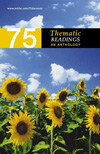
Alice Walker |  |
Alice WalkerAlice Walker, "Beauty: When the Other Dancer Is the Self" Alice Walker (1944- ), born and raised in Eatonton, Georgia, earned a
B.A. from Sarah Lawrence College in 1965. Walker is a novelist, short
story writer, poet, essayist, and children's book author. Walker tends
in her fiction to deal with personal and family relationships, particularly
among black women, and their struggles with racism and sexism. She received
much acclaim for The Color Purple (1982), a novel about the trials
and eventual triumph of a young black Southern woman in the early 20th
century. The novel won the Pulitzer Prize in 1983 and was made into a
successful film in 1985. Her other novels include By the Light of My
Father's Smile (1998) and The Way Forward Is with a Broken Heart
(2000). Walker's work can also be found in such periodicals as Monthly
Review, the Washington Post, Essence, and Ms. Magazine.
"Beauty: When the Other Dancer Is the Self" is taken from In
Search of Our Mothers' Gardens: Womanist Prose (1983). | QUESTIONS FOR DISCUSSION | CONTENT - What did the third floor of Walker's new grade school formerly
house?
- Describe the relationship between Miss Mey and the author's mother.
- Who is Miss Yarborough?
- How does the author feel about being on the cover of a magazine
at the time of the writing of this piece?
- Describe the author's relationship to her poetry.
- How does Rebecca react upon viewing the author's eye? How does
Walker react to her reaction?
- What changes in Walker's life when she becomes eight years old?
STRATEGY AND STYLE - Explain this essay's title in light of the author's view of beauty
and self-identity. How effective do you find it? Explain.
- Discuss "Beauty: When the Other Dancer Is the Self" as
a comparison/contrast essay. Support your answer with specifics from
the text.
- Why do you think Walker repeatedly puts quotation marks around
the word accident? How can you relate this punctuation to her
feelings about the event?
- In the last paragraphs the author departs from her mainly chronological
approach. What incidents does she recount? What would she lose if she
presented these things chronologically?
- In paragraph forty-three, Walker includes one of her poems. How
else could she have conveyed this information? What does the poem provide
besides information? How would the essay change without it?
| ENGAGING THE TEXT | - How important is how you look to your self-identity? If you could
change one thing about your appearance what would it be, and why would
you change it? How can you relate these things to your reading?
- How did you imagine the author's appearance at different stages
of her life as you read this essay? How did this affect your reading?
(Note: Some of the links below lead to pages with pictures of the author.)
| SUGGESTIONS FOR SUSTAINED WRITING | - Write an essay centering around the different kinds of blindness
the author mentions or alludes to in your reading.
- Look through your text to read or re-read Camille Paglia's "Rape
and Modern Sex War" or Sojourner Truth's "Ain't I a Woman?"
and write a comparison/contrast essay about your choice and this piece.
| FOR FURTHER RESEARCH | Walker never says whether she appeared on the magazine cover or not.
By a careful reading you can determine about what year she was considering
such an appearance. Do some research to determine whether Walker appeared
on a magazine cover around that time. Why do you think she doesn't say
what her decision was in this regard? | WEB CONNECTION | Here is a film
review of The Color Purple. Have you seen the film? Have you
read the book? What can you learn just from reading a film review? What
kinds of questions would make it necessary to consult the book? | LINKS | Biographical This is Walker's page
at Voices From the Gaps. There, you'll find a photo, some excerpts,
a biography, two bibliographies, and links. It's a great place to start
your online research. Looking for more Alice Walker links? This page
has a great collection, and biographical material, too. In an interview
with the Daily Beacon of the University of Tennessee, Walker
shares some personal moments about her family and growing up.
Bibliographical This is a letter
Walker sent to President Clinton. In it she declines an invitation to
the White House and criticizes the former President's policies regarding
Cuba. How accurate do you think this text is? How can you tell? Interested in how Walker and Steven Spielberg got along when they worked
together? Here is an interview
with Walker at Salon about the filming of The Color Purple. Speaking of interactions with other artists, here's an article
by Walker about Flannery O'Connor. Can you make any links between the
works of these two women? Thematically? Regionally?
Cultural If you'd like to put Walker's work into a historical context, you
will want to know something about the Civil Rights Movement in the U.S.
To get you started here's a good general page
about the Civil Rights Movement from The Encyclopedia Britannica. An interesting way to see the scope of Walker's work is to browse through
the list of her citations at the Library
of Congress. What did you find there that you didn't know before
your visit? Search for a New York Times book review of one of Walker's works
here. What book
did you choose and what did the reviewer think of it? How can you tell?
(Free registration required.)
|
|
|
|